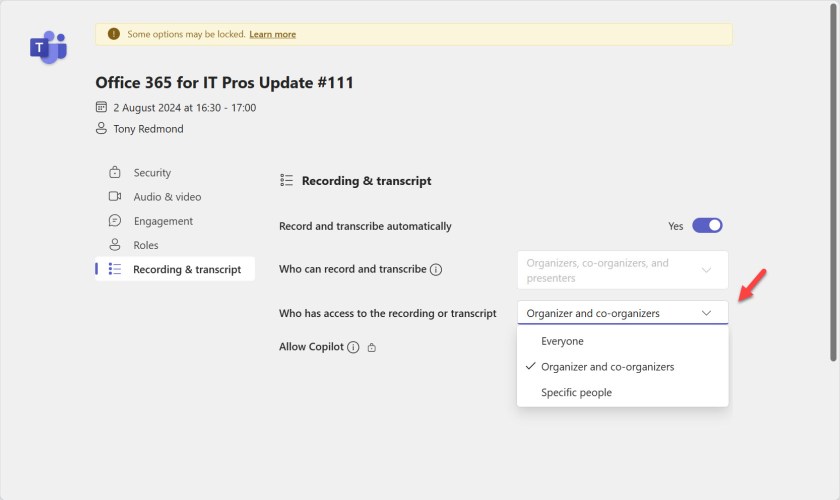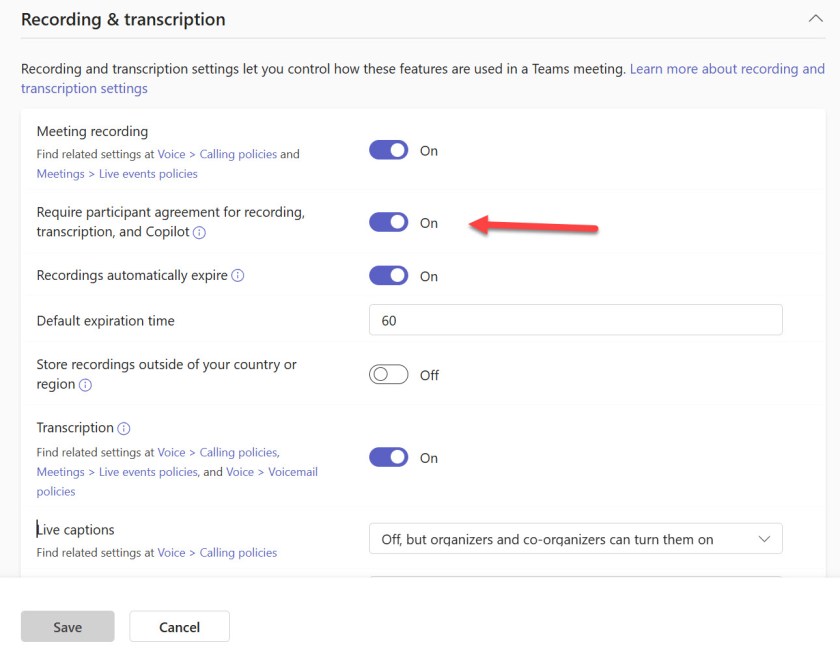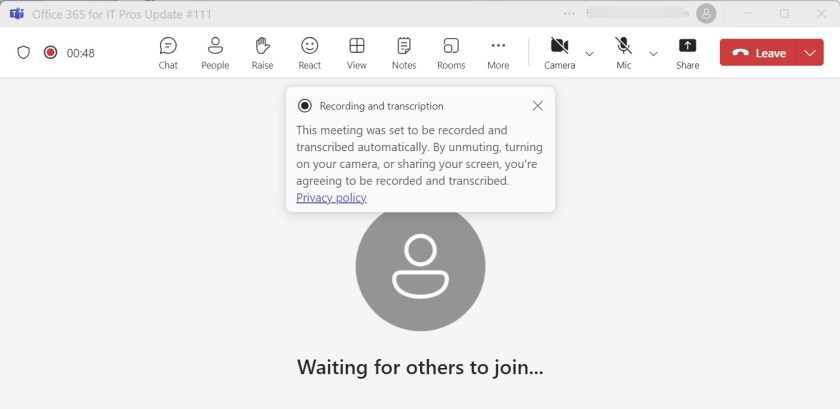Table of Contents
Teams Meeting Transcripts Deserve Protection
A bunch of changes have been rolling out for Teams meetings to tighten control over the artifacts generated during calls. The catalyst for the updates appears to be the recent change to store Teams meeting transcripts in OneDrive for Business. Meeting transcripts are critical artifacts in many ways because they are used as the basis for intelligent recaps, Copilot for Microsoft 365 queries, and closed captioning. Because transcripts can capture confidential information in participant contributions during calls, it’s sensible for organizations to protect this data appropriately. Let’s discuss the recent changes.
Controlling Access to Teams Meeting Transcripts and Recordings
First, MC795083 (22 May 2024) reports that meeting organizers can dictate who gets access to meeting recordings, transcript, and the AI recap (which is generated from the transcript). The setting to control access is now part of meeting options (Figure 1). Meeting participants not granted access still see the artifacts listed in meeting chat but won’t be able to open or download the files.

Associated with this change is message center notification MC781595 (last updated 13 June 2024, Microsoft 365 roadmap item 332800). As described, you might assume that Microsoft is introducing a new policy to allow tenant administrators to restrict permissions to download meeting transcript files. In fact, it’s an extension of the existing SharePoint Online block file download policy. Blocking downloads of Teams meeting recordings has existed since March 2023. Now that transcripts and full recordings are stored in MP4 files that look the same, the block download policy for Teams meeting recordings apply to the transcript-only files too. The downside is that the block file download policy requires SharePoint advanced management licenses.
Change to Participant Agreement Policy Setting
Teams meetings can be either transcribed or recorded. In both cases, Teams generates an MP4 file that’s stored in the meeting organizer’s OneDrive for Business account. The difference between transcription only and full recording is that the MP4 file for full recording contains a video stream and transcript while transcript files only contain the captions that collectively form the meeting transcript.
In any case, message center notification MC794819 (21 May 2024) reports that the participant agreement setting (aka explicit consent) in Teams meeting policies (Figure 2) now covers processing of all types of user generated content, including transcript only MP4 files and the analysis of a meeting generated by Copilot for Microsoft 365 from the meeting chat and transcript.

When the policy setting is enabled for a meeting where recording or transcription is used, participants must indicate their consent to be recorded by unmuting their microphone, enabling their camera, or sharing their screen (any of the 3 actions will do). If the participant fails to heed the warning (Figure 3) and give consent, they can participate in the call in view-only mode.

No Enriched Audit Records for Teams Meetings
One update that I see no sign of is the change announced in MC791598 (last updated 22 May 2024) to “enrich” audit records for Teams meetings with consent data. This information is available in attendance reports, which capture actions to turn unmute microphones or turn on cameras (both meaning a user gives consent). However, I see no trace of any ‘Added information about meeting participants” audit records despite the promise that worldwide deployment would complete in mid-June 2024 and the description in Microsoft documentation.
Taking Care of Generated Notes
Teams meeting transcripts can be a tremendously valuable tool, especially when generative AI uses transcripts to produce recaps of meetings for those who can’t attend an event or those who need a little help to remember commitments made during calls. Although the captured text isn’t guaranteed 100% accurate (and won’t be more than 95% in my experience), it’s still better than most attempts to capture what happens during meetings in handwritten notes. The downside is the need to protect transcripts. The changes described here help.
earn more about how the Office 365 applications really work on an ongoing basis by subscribing to the Office 365 for IT Pros eBook. Our monthly updates keep subscribers informed about what’s important across the Office 365 ecosystem.
One Reply to “Teams Tightens Access Controls for Meeting Recordings and Transcripts”